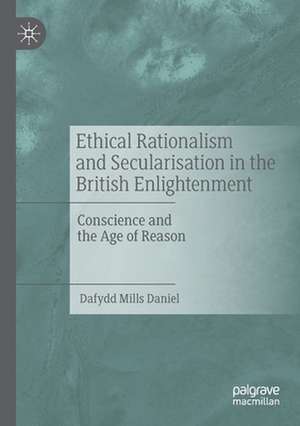Ethical Rationalism and Secularisation in the British Enlightenment: Conscience and the Age of Reason
Autor Dafydd Mills Danielen Limba Engleză Paperback – 24 oct 2021
The chapters cover a rich collection of subjects, ranging from the Enlightenment’s secular legacy, reason and conscience in the history of ethics, and controversies in the Scottish Enlightenment, to the role of British moralists such as John Locke, Joseph Butler and Adam Smith in the secularisation of reason and conscience. Each chapter expertly refines Enlightenment ethical rationalism by reinterpreting its most influential proponents in eighteenth-century Britain – the followers of ‘Isaac Newton’s bulldog’ Samuel Clarke – including Richard Price (Edmund Burke’s opponent over the French Revolution) and John Witherspoon (the only clergyman to sign the US declaration of Independence).
| Toate formatele și edițiile | Preț | Express |
|---|---|---|
| Paperback (1) | 728.53 lei 6-8 săpt. | |
| Springer International Publishing – 24 oct 2021 | 728.53 lei 6-8 săpt. | |
| Hardback (1) | 733.78 lei 6-8 săpt. | |
| Springer International Publishing – 23 oct 2020 | 733.78 lei 6-8 săpt. |
Preț: 728.53 lei
Preț vechi: 888.46 lei
-18% Nou
Puncte Express: 1093
Preț estimativ în valută:
139.41€ • 149.07$ • 116.23£
139.41€ • 149.07$ • 116.23£
Carte tipărită la comandă
Livrare economică 17 aprilie-01 mai
Preluare comenzi: 021 569.72.76
Specificații
ISBN-13: 9783030522056
ISBN-10: 3030522059
Pagini: 344
Ilustrații: XII, 344 p.
Dimensiuni: 148 x 210 mm
Greutate: 0.47 kg
Ediția:1st ed. 2020
Editura: Springer International Publishing
Colecția Palgrave Macmillan
Locul publicării:Cham, Switzerland
ISBN-10: 3030522059
Pagini: 344
Ilustrații: XII, 344 p.
Dimensiuni: 148 x 210 mm
Greutate: 0.47 kg
Ediția:1st ed. 2020
Editura: Springer International Publishing
Colecția Palgrave Macmillan
Locul publicării:Cham, Switzerland
Cuprins
1. The Enlightenment's Legacy.- 2. Conscience, Normativity, and Rational Intuition.- 3. Conscience or Complacency? Neo-Kantianism, Deism, and Practical Reason.- 4. Conscience or Moral Sense? The Contest for Enlightenment in Scotland.- 5. The Secularisation of Conscience.- 6. Conclusion.
Notă biografică
Dr Dafydd Mills Daniel is McDonald Lecturer in Theology and Ethics at the University of Oxford, UK. His BBC radio documentaries include: Sir Isaac Newton and the Philosophers’ Stone and Where do human rights come from? He is the author of Briefly: Nietzsche's Beyond Good and Evil, and co-author (with David Mills Daniel) of Ethics and Moral Philosophy and Briefly: 25 Great Philosophers from Plato to Sartre.
Textul de pe ultima copertă
This book reassesses the ethics of reason in the Age of the Reason, making use of the neglected category of conscience. Arguing that conscience was a central feature of British Enlightenment ethical rationalism, the book explores the links between Enlightenment philosophy and modern secularisation, while responding to longstanding criticisms of rational intuitionism and the analogy between mathematics and morals, derived from David Hume and Immanuel Kant. Questioning in what sense British Enlightenment ethical rationalism can be associated with a secularising ‘Enlightenment project’, Daniel investigates the extent to which contemporary, and secular liberal, invocations of reason and conscience rely on the early modern Christian metaphysics they have otherwise disregarded.
The chapters cover a rich collection of subjects, ranging from the Enlightenment’s secular legacy, reason and conscience in the history of ethics, and controversies in the Scottish Enlightenment, to the role of British moralists such as John Locke, Joseph Butler and Adam Smith in the secularisation of reason and conscience. Each chapter expertly refines Enlightenment ethical rationalism by reinterpreting its most influential proponents in eighteenth-century Britain – the followers of ‘Isaac Newton’s bulldog’ Samuel Clarke – including Richard Price (Edmund Burke’s opponent over the French Revolution) and John Witherspoon (the only clergyman to sign the US declaration of Independence).
Caracteristici
Reassesses the ethics of moral reasoning in the Age of the Enlightenment Argues that conscience was a central feature of British Enlightenment ethical rationalism Refines Enlightenment ethical rationalism by reinterpreting its most influential proponents in eighteenth-century Britain
